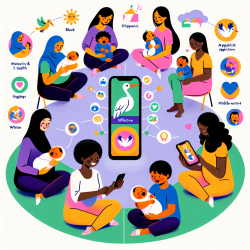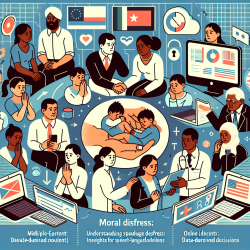The Shocking Truth About Maternal and Infant Health Apps: Are They Really Effective?
In the digital age, mobile health (mHealth) apps have become a staple in our daily lives, promising to revolutionize health care delivery, especially for maternal and infant health. But are these apps truly effective? A recent scoping review titled Exploring Maternal and Infant Health App Development and Effectiveness Research: Scoping Review sheds light on this question, providing valuable insights for practitioners looking to enhance their skills and improve health outcomes for mothers and infants.
Understanding the Current Landscape
The scoping review analyzed 11 unique studies published between 2017 and 2021, focusing on the development and effectiveness of maternal and infant health apps. The findings reveal a burgeoning field with a plethora of apps, yet only a handful are developed with the end-users' needs in mind. Alarmingly, only one app was endorsed by an independent healthcare provider society, highlighting a significant gap in professional validation.
Key Findings and Recommendations
The review identified several critical issues with current maternal and infant health apps:
- Lack of Standardization: Many apps lack standardization, making their content questionable and potentially harmful.
- Privacy Concerns: The review raises concerns about data privacy and the need for transparent data protection policies.
- End-User Engagement: Effective apps should engage end-users in their development and evaluation processes, yet this is often overlooked.
Despite these challenges, the review highlights the potential of mHealth apps to achieve health equity goals and improve maternal and child health outcomes. To harness this potential, the review recommends:
- Developing Guidelines: There is a pressing need for professional or institution-specific guidelines to ensure app safety and effectiveness.
- Enhancing End-User Engagement: Engaging end-users in all stages of app development can enhance app longevity and effectiveness.
- Focusing on Diverse Populations: Apps should be designed to cater to diverse populations, including non-English speaking and low-income mothers.
Implications for Practitioners
For practitioners, these findings underscore the importance of critically evaluating the apps they recommend to patients. Practitioners should advocate for apps that are not only evidence-based but also culturally and linguistically appropriate. Additionally, practitioners can play a crucial role in the development and evaluation of these apps by collaborating with developers and providing feedback based on clinical expertise.
Conclusion
The scoping review serves as a wake-up call for the healthcare community. While maternal and infant health apps hold promise, their current state is marred by a lack of standardization, privacy concerns, and insufficient end-user engagement. By addressing these issues, we can unlock the full potential of mHealth apps to improve health outcomes for mothers and infants worldwide.
To read the original research paper, please follow this link: Exploring Maternal and Infant Health App Development and Effectiveness Research: Scoping Review.










